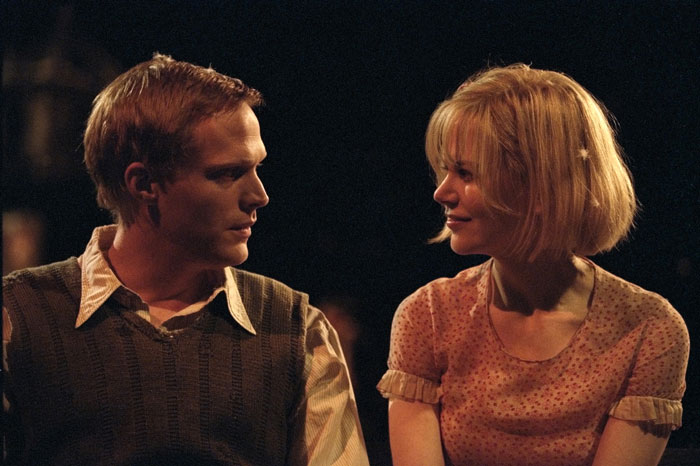There's pretty much no middle ground with a film like Dogville. It is designed to provoke savage reaction. Guessing which side of the arguement you'll be on—savagely for, or savagely against—is tricky to predict.
Von Trier, I've long maintained, is one of the most interesting filmmakers working on the international scene right now. From 1984's noirish The Element of Crime to 1994's epic, experimental horror film The Kingdom (currently being moronified by Stephen King) to 1996's soul-shattering drama Breaking the Waves to 1998's Dogme 95 declaration The Idiots, von Trier has cobbled together a confoundingly brilliant résumé.
Starting with Breaking the Waves, however, von Trier settled upon a formula of storytelling with which he now seems completely obsessed. His follow-up effort, 2000's Dancer in the Dark, expanded tenfold on the previous film's idea of “woman as saintly martyr.” Watching von Trier put trippy Icelandic chanteuse Björk through a physical and emotional wringer that would have made Mel Gibson passionate was certainly one of the most unpleasant movie-going experiences I've ever had.
So what are the odds that Nicole Kidman, the star of von Trier's newest effort, will be put through the Tortures of Hell in the name of whatever self-flagellent post-feminist idiology von Tier is pushing these days? Real good.
In Dogville, Kidman plays Grace, a symbolically sobriquetted gal who appears in the tiny, titular mountain town during the depths of the American Depression. It appears that Grace is on the run from some nasty gangster types. Immediately, she is befriended by Tom Edison (Paul Bettany), the town's resident philosopher, who seizes upon Grace's arrival as a perfect demonstration of his newest theory. You see, Tom believes that the humble, Salt of the Earth residents of Dogville aren't as selfless and charitable as they profess to be. Perhaps if the townsfolk band together to help out this poor, unfortunate stranger, they'll learn something about themselves and their moral fiber.
At first, the folks in Dogville are standoffish to the obviously rich and cultured Grace. Spurred on by Tom, Grace volunteers to help the reluctant residents out with their assorted menial tasks, and is soon a valued member of the community.
In time, however, the county sheriff shows up in Dogville with a wanted poster of Grace. Either she's done something horrible in the past or the gangsters have used their influence on the local law enforcement to flush their prey out of the woods. Either way, the fickle townsfolk start looking at Grace in a different light. Maybe it's too dangerous to hide her in Dogville after all. A compromise is reached, however: If Grace will help out a little bit more, perhaps the townspeople will be happier to have her around. At this point, most viewers will see what slippery slope this is heading down.
Over the course of the film, Grace devolves into a literal slave of the townspeople. The film is a hammer-into-anvil subtle parable. (It's even narrated—fairy tale-style—by soothing John Hurt.) Von Tier, it seems, has a point to make about capitalist society and damned if his isn't going to pound it into our heads, with Grace reduced from guest to worker to slave to prostitute to—ultimately— inhuman cattle.
The bulk of the film (and it is a bulky three hours) is taken up by the slow, unpleasant abuse of yet another von Trier heroine. It's kind of amazing the number of ways von Trier has come up with to torture and humiliate women. It is also very hard to sit through, and a great many audience members will opt out. (At least a third of the audience I saw it with ran for the exits.) Those who slog through it will be treated to a whopper of an ending, however. (Von Trier is helped, one must note, by a phenomenal cast.) As many times as I wish he could have toned the torture down, the ending just wouldn't have worked without the horrors before it. Some may still find the conclusion far too inflamatory. (It's pretty rough cultural criticism for someone who's never even been to this country.) But it does pack a whollop.
Odder even than von Trier's storytelling choices is his setting. The entire film takes place on a near-empty soundstage, with the leanest of props and chalk outlines on the floor to indicate buildings. It's a bold choice, meant to strip small-town America naked and expose the hypocracy taking place behind thin walls. Again, it's a bit self-conscious, bordering on pretentious, but damned if it doesn't work.
Dogville is an arguably brilliant film. It's also an arguably unwatchable film. Either way, you're right.



